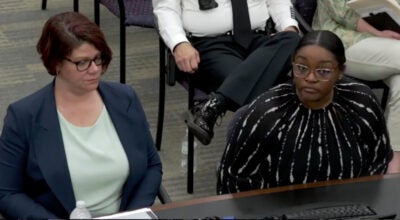‘Cried out to God’: Former addict speaks about recovery during United Way update
Published 6:59 pm Wednesday, October 16, 2019
SALISBURY — There are faces behind the disease of addiction, says Briana Stout.
“I’m not here because I’m different than anybody else,” Stout said Wednesday. “I’m here because my story is the same story as almost every single addict you’ve ever met. We’ve been in places where we felt hopeless and we felt like nobody cared, and there were not programs for us. There was nowhere for us to go.
“Somebody cared enough to put programs in place so that I can stand here and talk about what a lot of people have been through. … There is a way out.”
Stout, who will mark her 10th month of being drug-free next week, was the featured speaker Wednesday during the Rowan County United Way campaign’s update meeting. A beneficiary of a United Way-funded program, she spoke about growing up in a middle-class household but suffering abuse and turning to narcotics as a teenager to cope with the pain. And she described in detail how her life became something that she wouldn’t have imagined as a child.
“When you go to private school and you’re learning different languages and you’re going to practice after school, practicing your piano, and doing everything you’re supposed to do, you don’t ever wake up one day and say, ‘I want to be a heroin addict,’” Stout said. “But life happens. And because nobody diagnosed my mental health issues, my life took a turn for the worse.”
Stout, 28, joined the Coast Guard at the age of 17 and was assigned to a search-and-rescue team based in San Francisco.
“I did anti-terrorism, drug intersections, fishery boardings. I got to save lives. I really, really enjoyed it,” she said. “But it wasn’t long until my old lover, narcotics, caught back up with me.”
At 20, Stout said, she served time at Naval Consolidated Brig Miramar, a military prison near San Diego. When she got out, Stout entered rehab. With her entrance into the Coast Guard being the first, she said going to rehab was her second shot at sobriety.
Stout later moved to Charlotte and became a bartender.
“My old lover showed back up, and I was able to stay away from him for the most part, but he showed back up socially,” she said. “It was in the pockets of men in suits that worked at banks. He was in the car of the manager at my restaurant. See, he wasn’t looking disheveled. He was coming like a wolf in sheep’s clothing from the pain that I had never dealt with. And it wasn’t long until he took control of my life again.”
By the time she was 24, Stout said, she had become an intravenous narcotic addict.
“His name had become ‘sex worker.’ His name had become ‘junkie.’ His name had become ‘sick,’” Stout said. “His name had become a lot of things that you never think about when you’re a kid.”
She tried using “maintenance drugs” prescribed by doctors, but she relapsed the first time that she missed a dose. And in December, she was arrested on drug charges and put in jail. It was then that she made a commitment and a promise to God to come clean.
“I was put in jail. I remember sitting there in my cell. … It’s cold. It’s dark. It’s dank,” Stout said. “And for the first time in a long time, I just cried out to God.”
The side effects of detoxing from the combination of drugs Stout was on could have killed her, she said.
“I said, ‘Lord, if you would spare my life. If you would not let me die here so that my mother who worked so hard didn’t have to hear that her daughter passed away in jail. If you would do that for me, I’ll do whatever you want,’” she said.
Stout said she didn’t realize at the time that God had already saved her life by putting her in a jail cell.
Ten days later, she was teaching a Crossfit class at the jail. And she went to rehab when she got out.
“I told my mom I’ll go 30 days, and I knew that I was going to sign myself out after the 30 days. But next week I will pick up my 10-month chip, 10 months of sobriety,” she said.
Stout told the crowd gathered for the United Way meeting that donations to the annual campaign matter, particularly because she participated in a United Way-funded recovery program.
“Don’t get discouraged by numbers. There is a plan and a purpose for everything. God is going to use this to save lives,” she said.
Roughly halfway through the 2019 United Way campaign, fundraising has hit 40.4% of the original goal of $1.525 million. The best performing divisions of the campaign include special gifts, led by David Treme and at 84.8% of its goal; Industrial No. 2, led by Bob Cartner and at 74.5% of its goal; and Education, led by Andrew Smith and at 71.7% of its goal.
The updated fundraising goal is $1,526,191 — a result of calls for service to Emergency Medical Services for overdoses and suicides. In the two weeks since the United Way’s last update meeting, there were 30 calls for overdoses and 18 calls for suicides.
Money raised through this year’s campaign will go to programs providing services for mental health, substance abuse, healthy lifestyles and basic needs.



